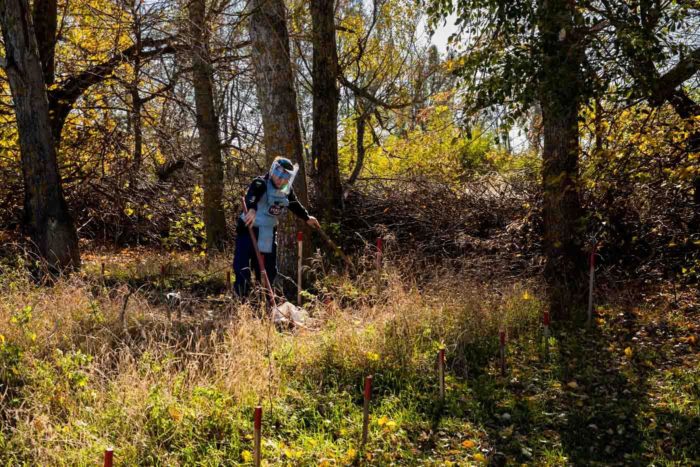Each day on the walk to their current worksite, Oleksandr Ponomarenko and his team from Halo Trust pass a tree with shreds of clothing hanging from its upper branches. The shreds are what remains of a jacket worn by a member of the State Emergency Service who was killed this past spring deactivating a landmine at the tree’s base.
For Ponomarenko and the demining team he supervises, this tree offers a grim reminder of what’s at stake for those working to clear the landmines and unexploded ordnance that have saturated large sections of Ukraine following Russia’s full-scale invasion.
“I’m in charge of four teams here; it can be hard to manage this responsibility, but I am doing my best to keep everyone safe,” explained the 34-year-old from Bakhmut. “We don’t want any accidents. War brings nothing good.”
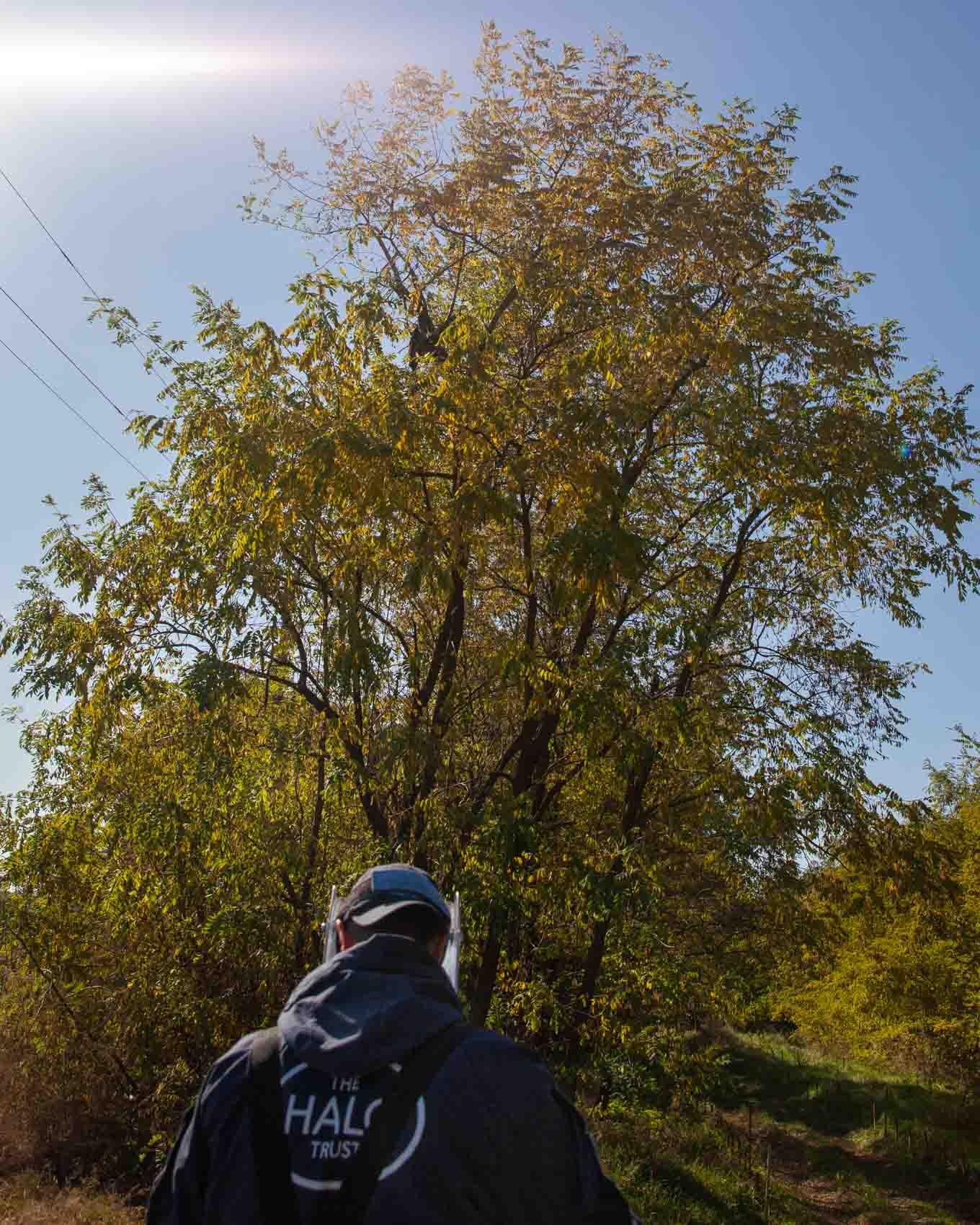
After eight years of war in the Donbas, Russia’s full-scale war has vastly expanded the scope of an already critical situation in Ukraine, with landmines and other explosives now littering former battlefields across the north, east, and south of the country.
In addition to the government’s State Emergency Services (DSNS), demining teams from international organizations, like HALO Trust, have constantly been working to clear these often hidden threats. Despite the dedication and courage of these demining teams, the scale of the problem remains, in many ways, overwhelming, emphasizing a need for more dedicated resources.
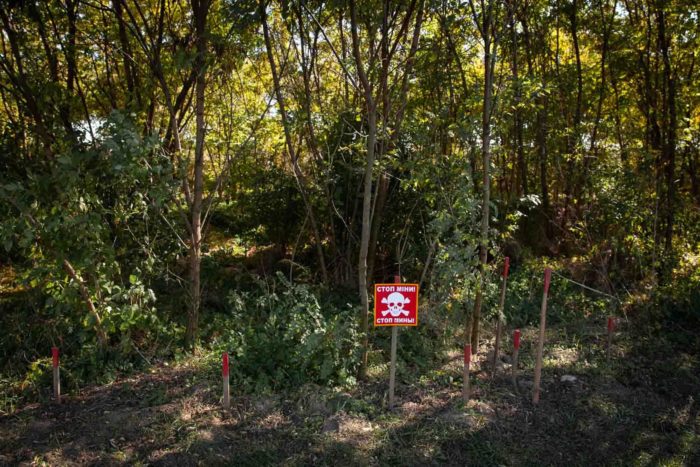
The area Ponomarenko and his team are currently working to clear is two farmland sections in the village of Velyka Dymerka. It is located outside of the town of Brovary in the eastern part of Kyiv Oblast. Russian forces briefly occupied the area from 14-30 March during their failed attempt to capture Kyiv. After being pushed back by Ukrainian forces, a scattering of landmines and other weapons have been found in the area, which saw the heavy use of artillery and Multiple Launch Rocket Systems (MLRS) during the battles.
Russian mines, destruction, looting: Ukrainian farmers deal with aftermath of occupation
Three people have already been killed in this particular stretch of farmland, termed Velyka Dymerka Site 1 & 4 by Halo Trust.
On 12 March, two civilians died when their car struck an anti-tank mine, launching chunks of metal radially outwards and leaving pieces of car seats and clothing in the trees above. On 4 April, a member of the DSNS was killed while removing a mine. Russian forces had buried a second mine underneath the one originally identified.
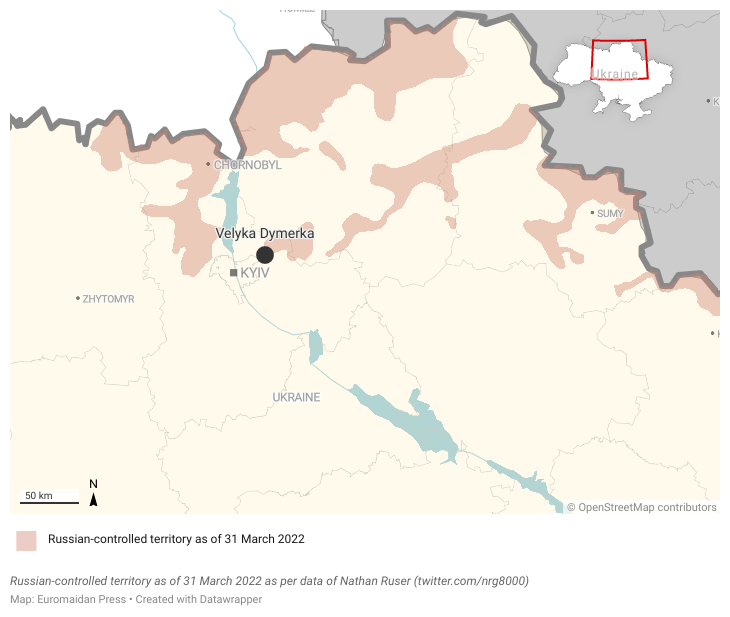
On 23 June, teams from Halo Trust began their ongoing work on the sections of land that total more than 37,964 square meters in size. Of this, roughly 10,000 square meters have been cleared without further incidents. Only one munition from a rocket-propelled grenade has also been found.
“We do what we can, within our capacity, and because of this we are very effective and have not had any accidents or injuries,” explained Ponomarenko, who has been working with Halo Trust since 2020 as a deminer, paramedic, and team supervisor.
The organization began working in Ukraine in 2015, focusing primarily on the territory of Donbas. It recorded over 2000 civilian deaths and injuries from landmines between 2014 and the start of the full-scale war. Since 24 February, at least 227 civilians have been reportedly killed by landmines or unexploded ordnance. The Ukrainian military estimated in September that over 70,000 square kilometers of land had been contaminated, up from a 2018 estimate of 21,000 square kilometers.
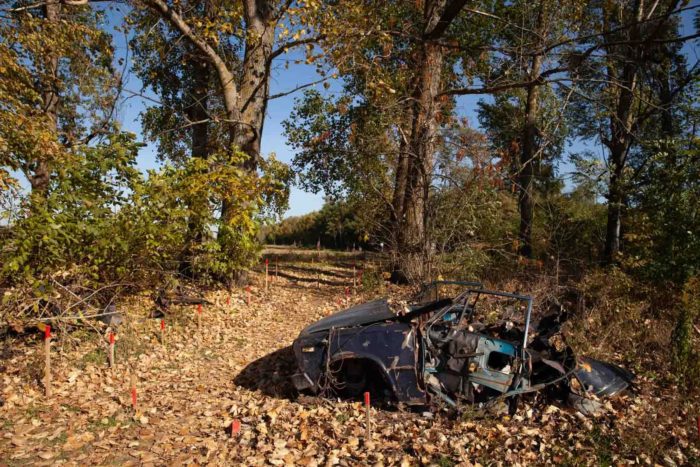
Considering the danger inherent to this type of work, the safety of each member of the nine-person team is given absolute priority, which while necessary, also means that clearing land can be a months-long process, particularly in dense treelines like those at Velyka Dymerka. Eight to 12 square meters are cleared per person per day.
For people living locally, time is not always a luxury they can afford. Farmers still work the land bordering the worksite, harvesting cabbage and apples despite the risk.
“It’s a hard and slow process; it takes time but the safety of the team has to come first,” explained 24-year-old Olesia Fesenko, a member of Halo Trust and originally from Kharkiv.
“It’s not as exciting as in the movies, it can be monotonous, but it’s work that has to be done,” she said.
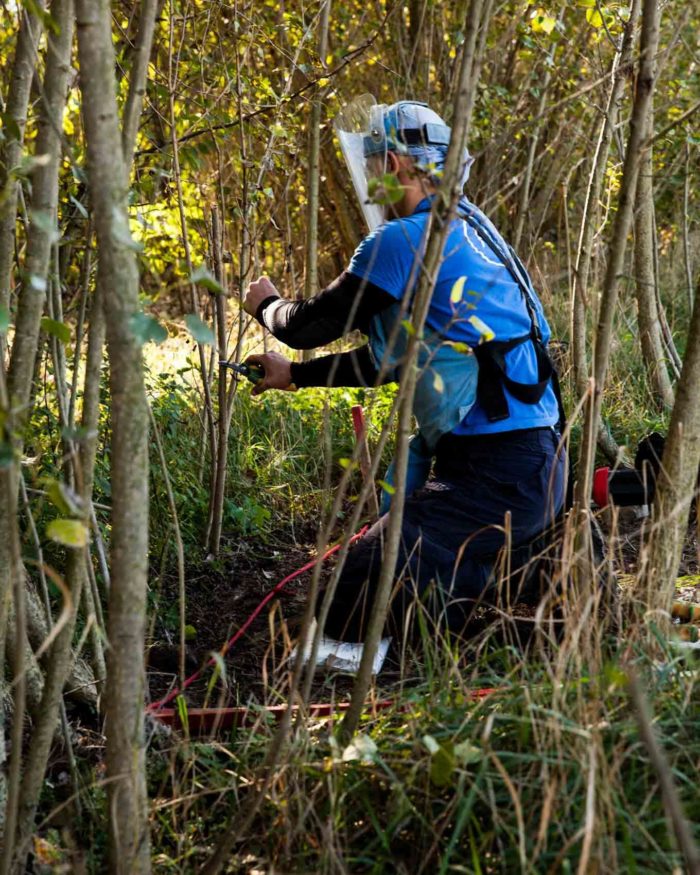
Though Halo Trust is attempting to expand its capacity over the next year, the sheer scale of the problem means organizations like Halo Trust can only perform a limited role, with the bulk of demining efforts currently conducted by the government’s State Emergency Service.
According to DSNS Press Secretary Oleksandr Khorunzhyi, since the start of the full-scale war, DSNS has discovered and neutralized roughly 287,000 explosive objects, including 2,154 aerial munitions, and has surveyed and demined more than 78,100 hectares of land.
Kids starved as Russians devoured the villagers’ chickens, pigs, and dogs: war crimes near Chernhiv
Deminers from the DSNS work in formerly occupied territories of Kyiv, Chernihiv, Donetsk, Mykolaiv, and Sumy oblasts. To meet the increasing need, their number was increased by 400 people in May, with the total number being more than 1,000. An additional 500 deminers are in the process of being trained and deployed.
Since the start of the full-scale war, over 50 members of the DSNS, including deminers, have been killed. On 24 December, three more were killed in Kherson Oblast, while another was killed on 4 January 2023 in Izium during demining operations.
Foreign governments have provided aid specifically for mine and explosive clearance to support these efforts.
In early August, the United States announced it would provide $89 million to support up to 100 demining teams in Ukraine. Halo Trust recently received £300,000 from the Scottish government, £2,000,000 from the UK government, and NOK 7 million (~$700,000) from Norway. Germany has provided €6 million to Halo Trust since February of 2022.
Since the start of the new year, the United Nations has allocated $4 million for demining operations in Mykolaiv oblast, while Canada has agreed to provide $5.6 million for demining. To help coordinate these efforts, Prime Minister Denys Shmyhal announced on 11 February the establishment of the Ukrainian Center for Humanitarian Demining, which will serve as Ukraine’s centralized demining hub.
How long it will take to clear liberated areas of unexploded munitions remains unclear. However, in May, the Ukrainian government estimated it could take ten years to completely clear the country of landmines and unexploded ordnance once the war ends.
Ukraine becomes world’s largest minefield due to Russian aggression – Ukraine’s PM
Halo Trust has identified 63 minefields in Kyiv, Chernihiv, and Sumy oblasts since the February invasion, with 25 of them being cleared and five completed. Across these sites works 42 demining teams, 16 survey teams, and nine tasked with education and raising local awareness. Physically clearing the fields are 350 deminers. However, this number is expected to grow as more applicants complete training courses.
“I’m shocked at how many people are currently suffering from this invasion and acts of violence from the Russian federation; we need more people working on demining activities to fight this crisis more effectively,” explained 31-year-old deminer Kirill Yena, also from Bakhmut.
Despite the enormity of the task, the Halo Trust team remains committed to their work.
“Those suffering most are civilians, just common people, who are being shelled and are at risk from mines,” explained Ponomarenko. “I want this to stop and this is why we do the work we do.”

Kris Parker is a freelance journalist and photographer from the US. He is currently working in Ukraine.
Related:
- Polish police have demined Kyiv Oblast during a secret 5-month operation
- Ukraine can’t use about 25% of sown areas due to Russian invasion – Agrarian Ministry
- Demining occupied part of Luhansk Oblast will take at least ten years – Oblast Head
- Mass graves in liberated Izium: Photo report
- How it is to have your home destroyed by a 2 AM Russian missile strike
- US provides Ukraine with USD 91.5 mn for demining: “demining in Ukraine biggest challenge for sappers since WWII”
- French government ready to help demining Chernihiv Oblast
- Ukrposhta started selling Patron the Dog charity stamps

